T1 Test to check molten metal flow and trial production
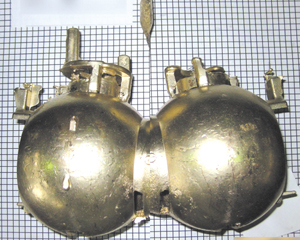
Metal mold temperature approximately 95°C
Temperature during pouring about 1010°C
Molten metal flow is good
Molten metal is filled all the way up to up-hill part for degassing.
When the product was made with a plan with fast molten metal flow supplied to product parts, overall run was sufficient.
The metal mold plan has a large influence on permanent mold casting.
A defect was found in trial production caused by shrinkage in the part sandwiched by the core, which is the part that solidifies last.
We believe the defect can be resolved by using a different gate thickness and position.
The varying components due to Zn depletion in molten metal appeared to cause changes in the flow of molten metal.
T2 Teeter mold test
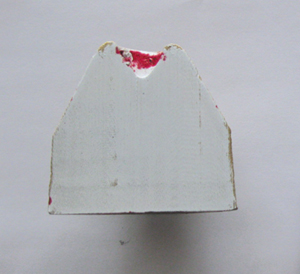
Result: Good It can be used for permanent mold casting
Internal shrinkage showed a smooth surface.
The deepest part of shrinkage did not contain any rough textured surface stained red on color check.(It is good)
A plan with consideration of large external overall shrinkage, large sinking at the tip, and shallow internal shrinkage is required.
Metal mold casting conditions may not be suitable.
A temperature range must be used that is suitable for permanent mold casting.
T3 Confirmation of mechanical properties
Tensile strength: 260 N/mm2 Degree of elongation: 29%
Standards of common brass material and bronze were met sufficiently.
T4 Analysis and confirmation of molten metal components
| Cu | Sn | Pb | Zn | Bi | Others | Cd | ||
|---|---|---|---|---|---|---|---|---|
| 1. | Standard value | 61.2-64.0 | 0.8-2.0 | – | REM | 0.5-2.5 | 0.28-1.55 | |
| 2. | Purchased materials | 63.62 | 1.33 | 0 | 34.48 | 1.54 | 0.66 | 5ppm |
| 3. | Before melting | 63.9 | 1.3 | 0.01 | 32.51 | 1.61 | 0.657 | 5ppm |
| 4. | At the time of test production | 61.6 | 1.26 | 0.01 | 34.47 | 1.42 | 0.669 | 6ppm |
Attention is required as Zn tends to be depleted and the value of Cu tends to increase.
At the time of true trial production, Zn is added with consideration of its depletion.
T5 Confirming processability
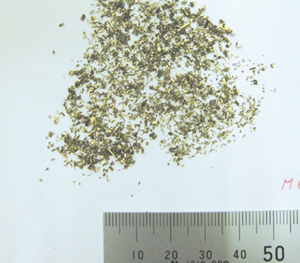
The impression is hard.
Chips are small.
Processability is good.
T6 Evaluation of pressure resistance of trial production
Result
This trial product was not perfect, but good results were obtained. Metal mold plan and casting condition have large effects on pressure resistance.
Preliminary trial production
Leakage was observed in all products in preliminary trial production.Leakage was observed at the part sandwiched by core sand that solidifies last.There was no leakage at the part in direct contact with the metal mold.
True trial production
It can be improved through thickness settings and the way molten metal flows based on the metal mold plan.After changing the plan and thickness setting of the product, the results in true trial production were good.
Results and evaluation
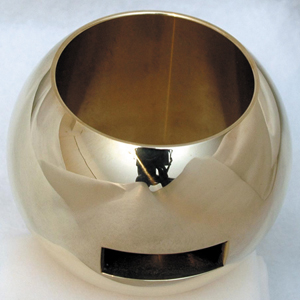
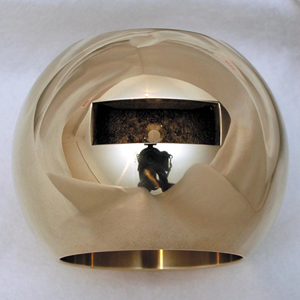
If the components of molten metal are sufficiently managed, metal mold castability by permanent mold casting is good.
It can be used for sealed type low-pressure permanent mold casting.Utilization in low-pressure permanent mold casting may be easier than in gravity metal mold casting method.
However, permanent mold casting conditions, such as pouring temperature and metal mold temperature, must be investigated.Mass production is easily possible in the present state if the permanent mold casting product is small.
Importance of the permanent mold casting plan is high, and it is necessary to change the characteristics of the plan from that used for common lead-containing brass.